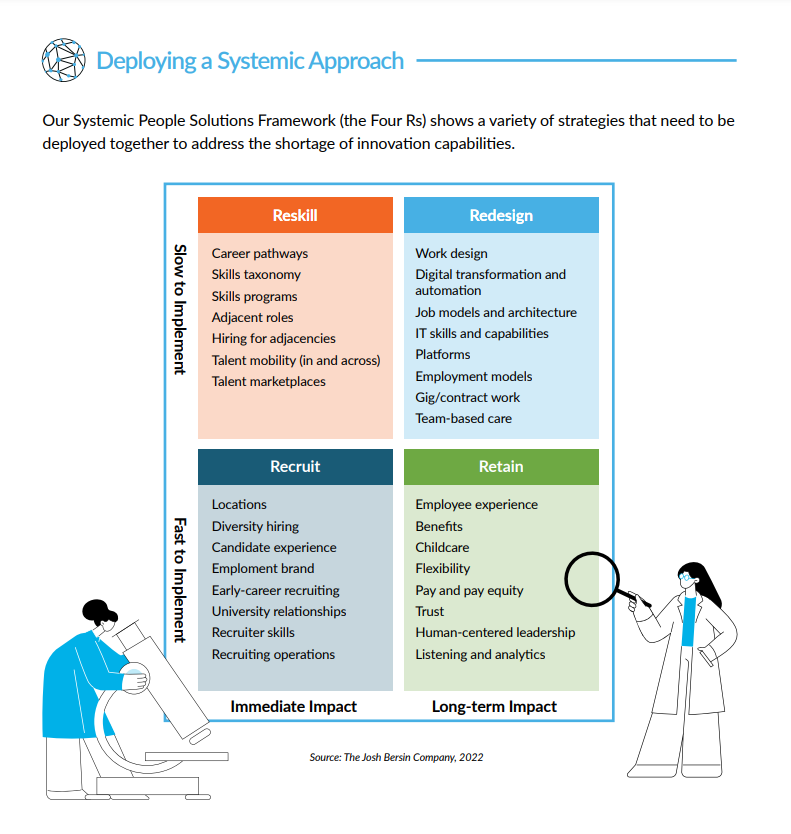Prescription for success: How India's Pharma Industry can overcome talent challenges

The pharmaceutical industry in India stands at the precipice of unprecedented growth. And organisations across the country must step up to reach new avenues of innovation and success.
According to Invest India, the industry is currently valued at $50 billion and stands as a major player on the international stage, exporting medicines to over 200 countries and positioning itself as the 'pharmacy of the world.' Its pivotal role in addressing health disparities and providing affordable medicines positions it as a cornerstone of international public health.
The Government's decisive push for growth is also evident through initiatives such as the Promotion of Research & Innovation Programme (PRIP) Scheme, the MedTech Policy, the Approach Paper on National Pharma Policy, and a thrust on 'One Health' during the G20 Summit. These efforts, coupled with the 'Make in India' program and the successful Production Linked Incentive (PLI-2) Scheme, signal a robust commitment to fostering innovation, research, and indigenous pharmaceutical manufacturing.

This rapid expansion, fueled by innovations, exports, and government initiatives, is paving the way for the industry to become a global leader. However, amidst this promising landscape, a critical bottleneck looms large – a talent shortage that could impede the realisation of its full potential.
Challenges Facing India's Thriving Pharma Industry
As the sector is propelled forward by ambitious targets and a global reputation for excellence, there remains a complex web of talent challenges that organisations need to address immediately.
Skill Shortage in Pharmaceutical Manufacturing:
Despite the industry's rapid expansion, there exists a critical shortage of skilled talent, particularly in pharmaceutical manufacturing. The talent pipeline has shown signs of failing to keep pace with the industry's exponential growth. There are hardly any academic institutions that cater to first-line jobs in pharmaceutical manufacturing, leading to a significant skill gap. This shortage is exacerbated by the industry's annual growth rates of 16.5% YoY in October ‘23, creating an urgent need for skilled professionals to drive production and innovation according to the Motilal Oswal Financial Services Ltd.
Lack of Diversity in Leadership Roles:
The leadership landscape within the pharmaceutical industry presents another formidable challenge – a lack of diversity. WalkWater Talent Advisors' comprehensive report reveals startling insights into leadership hiring trends in India's Active Pharmaceutical Ingredient (API) industry. Alarmingly, all companies studied had 100% male leadership in manufacturing roles, highlighting a glaring gender disparity. Additionally, 95% of leadership talent in manufacturing roles are Chemical engineers or Chemistry graduates, indicating a lack of educational diversity.
High Talent Churn and Aging Leadership:
The API industry also grapples with a high talent churn rate of 40% in manufacturing leadership roles, signalling instability and disruption within organisations according to the same report. Furthermore, the industry is experiencing an ageing leadership, with a pressing need for effective talent management strategies to groom younger leaders and ensure continuity.
Talent Demand-Supply Gap and Compensation Trends:
The talent demand-supply gap poses a significant challenge to the pharmaceutical industry's growth trajectory. TeamLease's hiring outlook report highlights that 86% of healthcare and pharma firms show serious intent for additional hiring, signalling fierce competition for talent. This is in accordance with the India@100 vision. According to the Walkwater Talent Adivsors’ report, there is a high demand for specialised skills which is reflected in the compensation trends, with compensation levels for leadership talent in the manufacturing function witnessing a notable increase. Surprisingly, the median CTC across levels are comparable to CTC trends in the FMCG industry for similar talent, underscoring the industry's premium on skilled professionals.
Strategic Solutions for Empowering India's Pharma Workforce
Within the flourishing landscape of India's pharmaceutical industry, these strategic solutions become indispensable to navigate and overcome the prevalent talent challenges, thereby fostering a workforce prepared for the future.
Invest in Reskilling and Collaborative Upskilling:
The dearth of specialised academic programs catering to first-line jobs in pharmaceutical manufacturing exacerbates the industry skill gap. Addressing this challenge requires targeted programs developed through collaborative ventures with academic institutions. Simultaneously, internal organisational upskilling programs must be instituted to ensure the workforce is adequately prepared for the demands of first-line roles.
Reskilling initiatives, particularly in emerging digital expertise, are also essential. A holistic approach encompassing forward-looking research skills, digital skills, and a comprehensive strategy for enterprise-wide skills is essential for sustaining innovation within the pharmaceutical industry.
The Josh Bersin Company also recommends deploying their Systemic People Solutions Framework (the Four Rs) to build innovation capabilities within the organisation, which is drawn from their research of successful ‘Pacesetter’ companies in the pharma and biotech industry. This framework shows a variety of strategies that must be deployed together.

Drive Digital Transformation for Streamlined HR:
Recognising that the pharmaceutical sector, like healthcare, agriculture, and finance, can unlock new growth avenues through digitalisation, Keka champions the cause by advocating increased reliance on cloud platforms, analytics, artificial intelligence, and machine learning. The tailored solutions offered by Keka cater to the diverse needs of pharmaceutical companies, whether they are hiring white-collar or blue-collar professionals. For instance, Keka empowers pharmaceutical companies to efficiently track their medical representatives and optimise their efforts through geo-tagging, preventing overlapping coverage areas and potential delays.
Keka's solutions, featuring a multilingual user interface, democratise access to the platform for all employees. The intuitive features simplify navigation, automating tasks like downloading pay slips, tracking attendance, shift allotment, leave encashment, and raising helpdesk tickets. The platform ensures that management gains direct access to employee data from any location, enabling the generation of reports across various divisions and obtaining analytic-based insights effortlessly. These automated HR functions not only enhance visibility and transparency but also require minimal time and effort, infusing productivity into pharmaceutical companies' core processes.


Cultivate Inclusive Leadership:
Amidst the remarkable growth of the pharmaceutical industry, a critical concern surfaces within the leadership landscape – a striking lack of diversity. The imperative now is not only to sustain this growth but to nurture an inclusive and innovative industry. To address this pressing issue, the implementation of targeted diversity and inclusion programs emerges as a strategic move, with a specific focus on promoting gender diversity within leadership roles.
Diversifying leadership isn't just a matter of gender inclusivity; it's also about embracing a comprehensive spectrum of educational backgrounds. Encouraging and facilitating individuals from various educational disciplines to assume leadership positions will not only bridge the diversity gap but also infuse fresh perspectives and approaches into the pharmaceutical industry.
Unlock Proactive HR Strategies with Talent Intelligence:
In the pharmaceutical realm, Talent Intelligence is a dynamic force powered by artificial intelligence, dissecting internal talent data and aligning with external market trends. According to the Josh Bersin company, leading pharmaceutical organisations recognise Talent Intelligence as pivotal, making nuanced decisions across hiring, development, mobility, retention, and work design. Establishing a collaborative Center of Excellence (COE) becomes imperative, where HR teams, hiring managers, and other stakeholders collaboratively navigate talent challenges, harness insights, and align strategies with the broader business agenda.
Identifying and prioritising critical talent challenges is also central to Talent Intelligence implementation. It offers tailored solutions, whether through establishing AI capability academies or facilitating mobility across research functions, aligning with organisational needs. Skill-based language equips organisations with real-time insights, aiding in addressing workforce readiness questions and driving systemic action.
Real-time data also guides the measurement of systemic solutions' success and proactively predicts emerging talent gaps. Customised solutions capture company-specific skills, elevating insights for senior leadership, HR teams, and employees alike. Ultimately, Talent Intelligence shapes both process and product innovation capabilities in the pharmaceutical landscape, ensuring organisations remain agile and future-ready.
Closing Remarks
In a landscape teeming with potential, India's pharmaceutical industry stands as a beacon of innovation and progress. With revenues projected to soar to unprecedented heights, the sector's global impact is undeniable.
However, challenges remain but these are not insurmountable. Through strategic interventions tailored to the industry's unique needs, India's pharma sector can not only overcome the talent crunch but emerge stronger and more resilient than ever before. Initiatives such as reskilling and collaborative upskilling, digital transformation with solutions like Keka, cultivating inclusive leadership, and leveraging Talent Intelligence offer a pathway to success.
By embracing these strategic imperatives, India's pharmaceutical industry can chart a course towards sustained growth and global leadership. With a future-ready workforce and a culture of innovation and inclusivity, the sector will not only transform healthcare landscapes but also drive economic prosperity for the nation. The time to act is now, as we navigate the talent tides and propel India's pharma powerhouse to new heights of success and impact.




